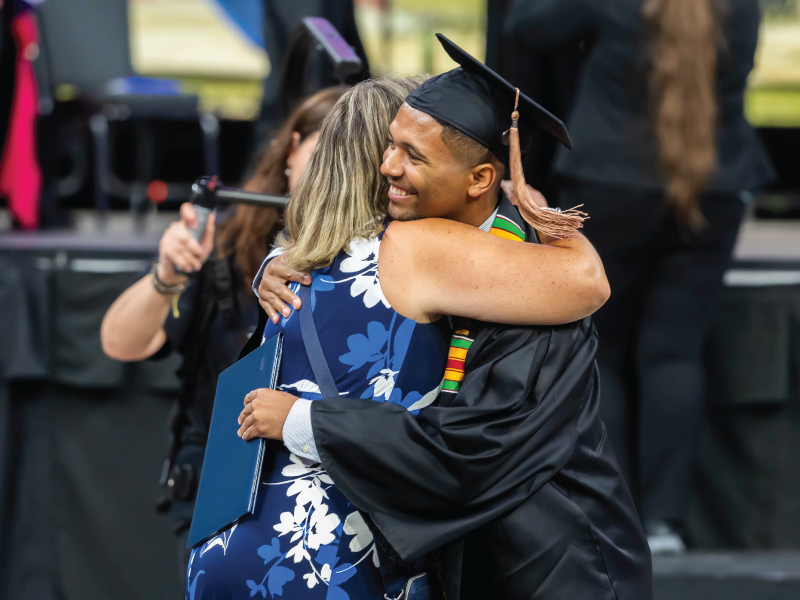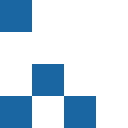A BA in Cybersecurity provides expertise in digital defense, specializing in ethical hacking or threat analysis to prepare you for the growing field of cybersecurity, digital investigations and forensics.
What is a Cybersecurity degree?
Reduce tuition by up to $24k
Why earn a BA in Cybersecurity?
Our Cybersecurity program provides small classes and cutting-edge labs. Hands-on learning, like the use of Encase Forensic, offers practical experience. You can collaborate with peers and expert faculty for an integrative education.
Hands-on learning
Industry technology is integrated into our coursework. You'll use programs like Encase Forensic to further your knowledge.
Supportive environment
Our faculty, staff and students create a learning environment, cultivating creativity, innovation and a sense of community.
Industry-aligned curriculum
Our program aligns with industry trends, ensuring you graduate with the skills and knowledge you need to succeed.
What you’ll learn in your Cybersecurity program
Master digital defense basics and robust cybersecurity strategies. Hone skills in ethical hacking or threat analysis. Learn about computer science and criminal justice for data recovery, identifying illegal activities, and server compromise investigations.
- Understand our dependence on information technology and its impact on global landscapes.
- Cover cybersecurity basics, common vulnerabilities, exploitation techniques and protection strategies.
- Learn about tracking, evidence collection on network-based systems, and detailed log and system file analysis.
- Work hands-on with compromised systems and case studies focusing on detailed analysis of storage media.
Explore Cybersecurity courses
- This degree will require you to complete a total of 120 credits.
- You will complete 39 gen ed credits, 45 credits in Cybersecurity, and 36 elective credits.
Sample Courses
| Class code | Class title | Credits |
|---|---|---|
| CSCI 250 | Introduction to Cybersecurity | 3 credits |
| CSCI 335 | Cybersecurity and Hacking | 3 credits |
| CSCI 375 | Network Forensics | 3 credits |
| CSCI 415 | Computer and Network Security | 3 credits |
| CSCI 425 | Computer Forensics | 3 credits |
How much does a BA in Cybersecurity degree cost?
The cost of your degree will depend on several factors, like scholarships, housing, meal plans, and transfer credits. New students also pay a $100 matriculation fee. You will also need to budget for books, supplies, materials, transportation, personal costs, loan fees, and other expenses. Explore the cost of attendance.
Full-time student living on campus
| Expense | By semester | By year |
|---|---|---|
| Full-time tuition (12-18 credits)* | $19,674 | $39,348 |
| Housing** | $4,313 | $8,625 |
| Food*** | $3,135 | $6,270 |
| Technology fee | $150 | $300 |
| Total direct charges (billable) | $27,272 | $54,543 |
*Based on 2026-2027 tuition and fees. Tuition and fees are subject to change each summer.
**This cost is estimated, actual housing cost will vary by student selections.
***Cost estimate based on 3 meals per day.
How much does campus housing cost?
When it comes to housing, St. Ambrose University offers diverse options to meet the needs of our students. From traditional dormitories to apartment-style living, there’s something for everyone. The cost of our housing will vary based on where you decide to live and the meal plan you choose.
St. Ambrose University is accredited by the Higher Learning Commission
Accreditation and recognitions provide the assurance we meet standards for quality of faculty, curriculum, learner services, and fiscal stability.
See all of SAU’s accreditations
How does SAU support Cybersecurity students?
Cybersecurity faculty bring expertise from diverse backgrounds including industry research and experience in law enforcement. Learn how to put theory into practice, build technical proficiency, and explore the latest techniques in cyber attack prevention.
Cybersecurity faculty
Other support resources

Student Success Center
At St. Ambrose, we want you to thrive. Access free tutoring, study groups, and supplemental instruction through our Student Success Center.

Accessibility Resource Center
Whether you need classroom accommodations, alternative exam arrangements, or disability support strategies, our Accessibility Resource Center is here to help.

Career Services
Our Academic and Career Planning Center is ready to help you polish your resume and land the job or internship that will launch your career.
Are there scholarships available for BA in Cybersecurity?
SAU believes education should be accessible to all. We offer a variety of scholarships and financial aid options to make college more affordable for our students so they can succeed academically and financially.
Ambrose Advantage scholarship
Through the Ambrose Advantage scholarship program, a tuition-free St. Ambrose University education is available to any Pell Grant-eligible Iowans. Learn more about the Ambrose Advantage.
Merit-based and institutional scholarships
St. Ambrose offers excellent scholarships and grants based on your strong academic performance, your talent in fine arts or athletics or your community involvement. Explore SAU scholarships.
Transfer credits
At SAU, you may be able to transfer previous college credit toward your bachelor’s degree, saving you significant time and money. Learn how to transfer credits.
Prioritize potential, not just price
"Cost is obviously a big thing for anybody going to college. When I found out about the Ambrose Advantage, it took the stress off me and my family. Now I can focus on my classes and getting a start on my career."
-Bailey Hird, Fairfield, Iowa
What’s on campus for Cybersecurity students?
Students have the opportunity to become involved in several activities on campus. As an IT student, you have the opportunity to join our Computer Club, as well as our Institute of Electrical and Electronic Engineers (IEEE) Student Branch.
What are the admission requirements for a BA in Cybersecurity?
Here are the admissions requirements for our Cybersecurity program.
- You must have graduated from an accredited high school or earned a GED.
- You must have a minimum cumulative, unweighted GPA of 2.5.
- You must provide an official high school transcript.
International student requirements
If you live outside of the U.S. there are different admissions requirements. Here’s what you’ll need:
- Official transcripts from secondary education
- A minimum 2.5 CGPA out of a 4.0 scale or equivalent
- Proof of English language proficiency (minimum scores: TOEFL - 79, IELTS - 6.0)
- Copy of your passport and other documentation
What can I do with a Cybersecurity degree?
Your degree can help you reach your professional goals. SAU can never promise a career or particular outcome upon graduating. Here is a list of potential job titles, traits and settings graduates of our Cybersecurity program could achieve.
Potential job titles
- Cybersecurity Analyst
- Information Security Specialist
- Cybersecurity Consultant
- Security Operations Center (SOC) Analyst
- Penetration Tester (Ethical Hacker)
- Security Compliance Analyst
Potential employment settings
- Corporate IT departments
- Government agencies
- Healthcare organizations
- Defense and military organizations
- Critical infrastructure companies
- Cybersecurity service providers
Traits of a Cybersecurity professionals
- Technical
- Adaptable
- Innovative
- Detail-oriented
- Vigilant
- Cybercrime-aware
Industry facts
- The median annual wage for information security analysts was $112,000 in May 2022.
- Employment of information security analysts is projected to grow 32 percent by 2032.
For more information on financial employment and wages, visit the Bureau of Labor Statistics’ Occupational Outlook Handbook.
News and events at SAU
 >
>
February Discovery Day
Get a glimpse into life as a Fighting Bee during Spring Discovery Day
Read more

15th undergraduate scholars conference
The 15th Annual Undergraduate Scholars Conference held on May 4 was attended by St. Ambrose faculty and families.
Read more

Faculty and Staff Honor Roll Spring 2022
A list of accomplishments from SAU faculty and teaching staff from June through December 2021.
Read more


Become who you are meant to be
With more than 50 undergraduate and graduate programs, there’s something for everyone at St. Ambrose University! Explore our programs to find your place at SAU.






